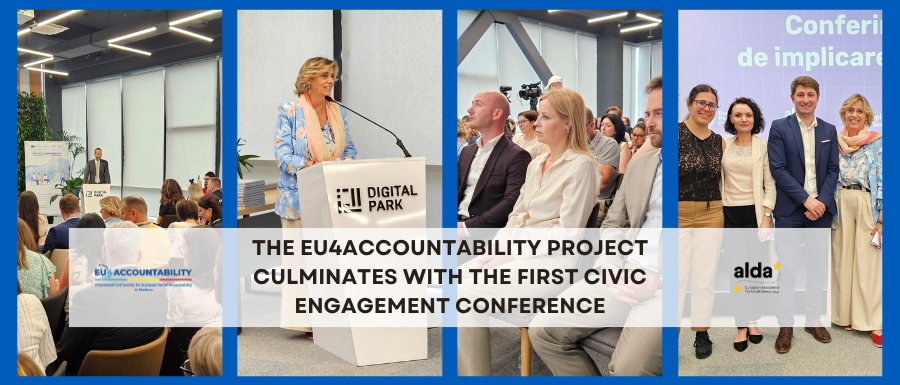On 5 June 2024, the final event of the EU4Accountability project took place in Chișinău (Moldova), marking a significant milestone in Moldova’s efforts to strengthen civic participation and accountability on its path to EU accession. The Civic Engagement Conference, organised by the EU4Accountability project and funded by the European Union, focused on the challenges of civic engagement and the role of citizen participation in decision-making processes at both national and local levels.
The EU4Accountability project, implemented across 10 districts of the Republic of Moldova, supported the capacity development of local authorities and CSO staff. It empowered 59 CSOs to conduct small-scale projects in civic engagement, participatory budgeting, and policymaking. This project exemplifies the cooperation between civil society and local public authorities aimed at improving the social accountability of local and central public authorities by strengthening the capacities of civil society organisations (CSOs).
“Citizens should know that the EU means stability, prosperity, and transparency, and the EU is ready to continue supporting Moldova’s efforts on the European integration path. We support community empowerment in Moldova, and I urge you to remain active and involved in implementing and monitoring public policies. Increasing the transparency of central and local government is crucial because the future and the power are in your hands.”
EU Ambassador, Mr. Janis Mazeiks
“A lot has happened in the last two years. We could say that the project has managed to reflect the realities here in Moldova and the region. We have shown that through local democracy, which is a concrete way of addressing and solving problems, the EU4Accountability initiatives allow our local communities to have European visions. We hope to continue benefiting from this.”
ALDA Secretary General, Mrs. Antonella Valmorbida
The conference featured two pivotal panel discussions. The first panel focused on the implementation of access to information laws. The second panel addressed current challenges in decision-making, identified priority actions, and established cooperation strategies between authorities and CSOs. Key participants included representatives from the Government, local authorities, and civil society. Key discussion points included the difficult access of local NGOs to national decision-making processes, lack of representativity, an outdated transparency law, and the obstacles that hinder the effectiveness of new cooperation platforms.
Speakers addressed key challenges in Moldova’s decision-making processes. Participants highlighted obstacles such as scarce resources, a lack of direct communication with policymakers, and insufficient recognition of their role, which hampers their ability to influence policies that affect their communities. Another critical point discussed was the lack of representation in decision-making bodies. Panellists emphasised the mismatch between governing institutions and the diverse population, leading to decisions that neglect the needs of marginalised groups and smaller communities, thus amplifying their voices in governance discussions.
The EU4Accountability project is funded by the European Union and is implemented by a consortium comprising the European Association for Local Democracy (ALDA), the European Partnership for Democracy (EPD), and the Czech organisation People in Need. The event was organised in cooperation with the think tank Centre for Policies and Reforms (CPR Moldova).
